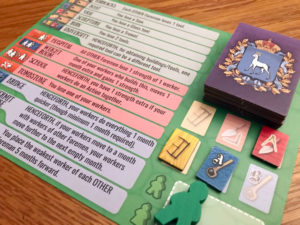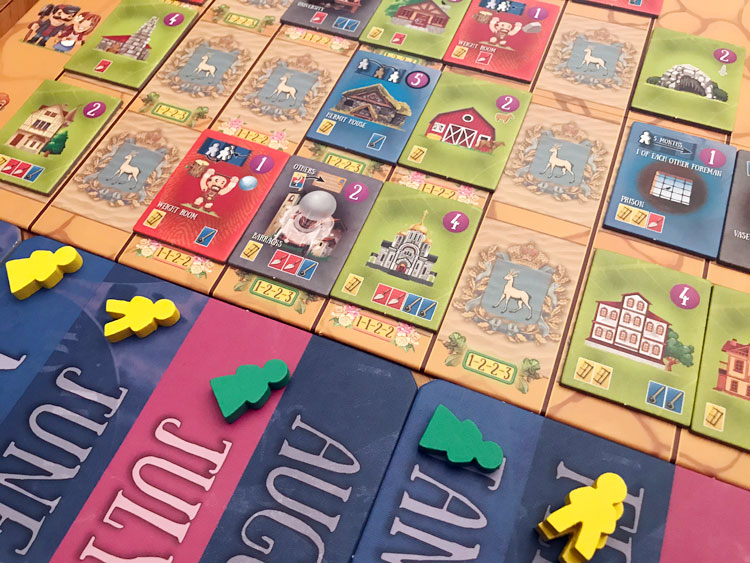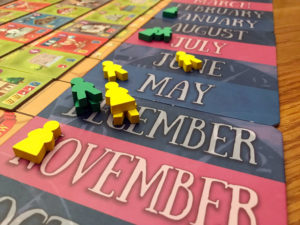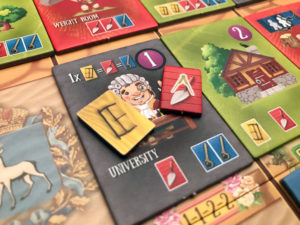 All types of resources are used to try to earn a victory in board games. It might be warships, coconuts, energy, or crystal skulls, but they all serve a purpose to inch you closer to the end goal. One resource that is brushed over quite a bit is the element of time. Where each of your actions puts your workers out of commission until the job is complete.
All types of resources are used to try to earn a victory in board games. It might be warships, coconuts, energy, or crystal skulls, but they all serve a purpose to inch you closer to the end goal. One resource that is brushed over quite a bit is the element of time. Where each of your actions puts your workers out of commission until the job is complete.
The game we will be looking at today uses that often forgotten resource as the major mechanic in the game. Samara is a game where you are trying to be the best Foreman in town by earning prestige by completing buildings. Players will move their workers along the calendar and have to wait until enough time has passed to use those workers again.
Samara is a time management euro game for 2-5 players that plays in 30-45 minutes. In my experience, the game plays best with 2-4 players.
Game Overview:
In Samara, each player is a foreman in this small settlement. Players are competing to see who can build the best buildings in the town. At the start, you will only be able to build primitive buildings, but over time you will collect tools and more workers to help you complete more complex structures.

The game starts with thirty building tiles on the board in four rows and spread over nine columns. Near the bottom of the board are three tiles that make up the calendar. In order to build any building, you must move your worker to the month that is in the same column as the tile. In addition to time, you need to have enough worker strength, which costs more as you move up the rows of the game board. The basic buildings can be built with just time and strength, but the more complex ones require tools to complete.
Each round, if any workers are in the current month, they take their actions. You can build a building or collect a tool by moving any of the workers on that current month. If they all move to the same space, they can combine their strength together. You can also choose to take a vacation and move a worker to the same spot as the next worker on the time track.
The last option for players is to take one of their female workers and move them to the furthest pink space on the calendar. This will allow you to place a new worker on the calendar and, thanks to child labor laws in this town, be able to use them the next time they come up on the calendar track.
Most buildings just earn you victory points for end game scoring, but a few will have effects on you, both good and bad. The years will roll on until all the buildings are built, the player with the most prestige points wins the game!

Game Experience:
Samara is a game of perfect information. Everyone at the table sees the same thing and has an opportunity to claim buildings or tools right out the gate as long as they can get to them first. Instead of random events or hidden objectives, players must figure out the most efficient way to move their workers up the calendar.
What makes this game work is this puzzle and balancing act throughout the different stages of the game. At first, you must balance earning easy prestige points with gaining the tools necessary to build some of the more complex buildings. The middle game is all about efficient movement of your workers and gaining a few more workers to give you more flexibility for your actions. This is generally how it goes, but players must adjust to what the board and other players give you.

The real star of the game is the calendar time system. Such a simple mechanic works really well to give players options on their turn. Taking a leap further out in time might mean you get that tool, building, or extra worker, but other players will be able to make multiple moves while your workers wait. It is a little annoying to have to keep sliding the calendar forward as you go through the game, but worth the effort for the decisions you have to make because of the time mechanic.
The only downside to the game is the last few rounds, as there isn’t that same decision-making required. Players are strictly on autopilot as they clean up the remaining buildings to end the game. This doesn’t erode the previous experience but there isn’t an exciting turn that happens at the end of the game. Your success in the game comes from earlier in the game.

Finally, I really liked how the buildings set up is completely random and, with an extra five building tiles, you will never get the same setup twice. This forces players to evaluate the board every time, rather than just have a preset process. There are times where you will skip tools or rush to claim tiles because of how the board is laid out. This constant change keeps the game fresh every time.
Final Thoughts:
I was surprised how much I enjoyed Samara. It is a light Euro game that strikes a great balance of difficult decisions with simple game mechanics. The use of the calendar system works remarkably well and is something I hope finds its way into future games. You must constantly balance your actions with how much time those workers will be out of commission. While Samara does have a few flaws with the endgame slog and finicky calendar movement, the game had found its way to my table frequently. Samara comes in a small box, however, it packs a solid game that is worth having in your collection.
Final Score: 4 Stars – A light Euro game that finds the right balance of understandable mechanics and great design that leads to an engaging experience.
 Hits:
Hits:
• Great calendar mechanic
• Plenty of interesting strategic decisions to be made
• Right balance of player interaction
Misses:
• Last few rounds are not meaningful
• Moving the calendar tiles gets tiresome.






















